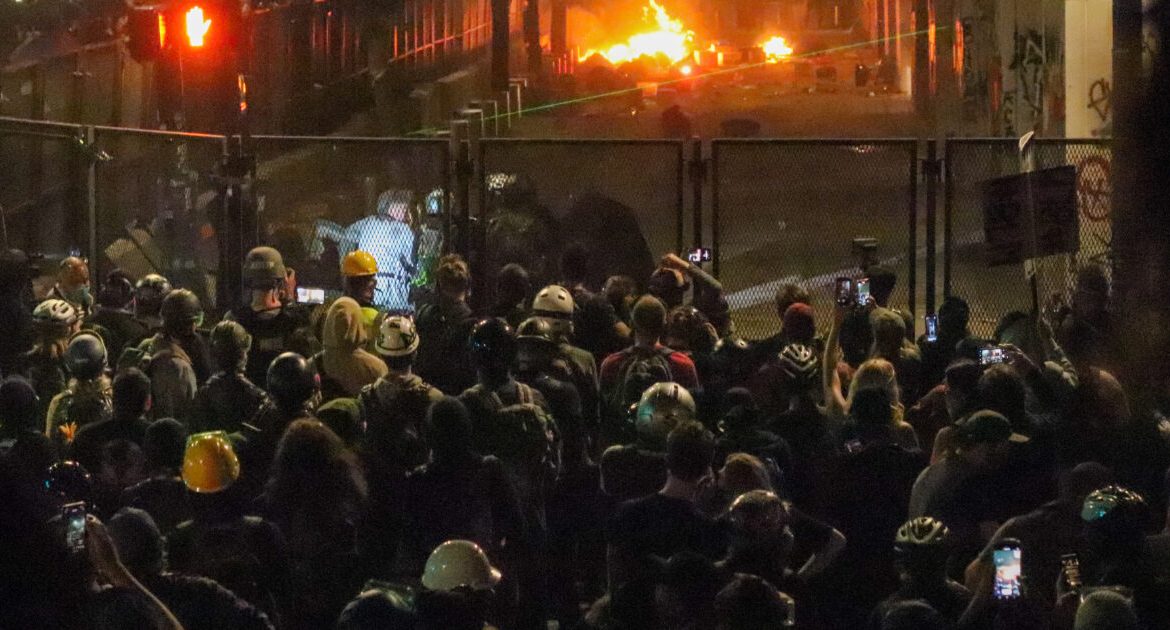
Democrats Demand More Crime in Portland, Oppose President Deploying Troops


President Trump announced Saturday that, at the request of Homeland Security Secretary Kristi Noem, he was directing Defense Secretary Pete Hegseth to send troops to Portland to protect the city and Immigration and Customs Enforcement (ICE) facilities.
Trump said he was also authorizing “full force, if necessary.”
DHS Assistant Secretary Tricia McLaughlin justified the request by citing weeks of violent riots at ICE facilities, assaults on law enforcement, and the terrorist attack at an ICE facility in Dallas.
A DHS release noted three anti-ICE incidents in Portland in late June and said rioters have repeatedly attacked the city’s processing center.
Protests outside Portland’s federal ICE detention facility have been ongoing since June, with flareups on July 4 and Labor Day. Many turned violent, prompting tear gas deployment and temporary facility closures.
As expected, the usual suspects, liberals and Democrats, opposed the president’s move to enforce existing laws and defend federal property. Senator Ron Wyden (D-Ore.) told Trump to “stay the hell out” of Portland after the announcement.
Wyden disputed Trump’s claim that ICE facilities were “under siege,” posting a video of a quiet site and insisting the city did not need federal troops.
Social media users quickly challenged Wyden, posting clips of unrest around the facility and pointing out that violence often erupts at night.
Local reports acknowledge that demonstrations have continued throughout the summer.
Leaving law enforcement and federal officers under repeated threat.
The Pentagon confirmed it is prepared to mobilize forces. “We are ready to support DHS operations in Portland at the president’s order,” said Pentagon spokesman Sean Parnell.
Trump reiterated that troops would be deployed to protect Portland from antifa and other domestic terrorist groups.
Oregon’s status as a “sanctuary state” complicates matters, since state and local law enforcement are barred from cooperating with federal immigration enforcement.
That leaves federal officers and facilities more vulnerable, underscoring the administration’s rationale for sending in troops.
If the deployment goes ahead, Portland would become the fourth city where Trump has sent military personnel, following Los Angeles, Washington, D.C., and Memphis.
The current deployment is meant to avoid a repeat of the chaos that gripped Portland during the 2020 George Floyd and BLM riots, when the city became an epicenter of violent unrest.
Demonstrations often turned destructive, with arson, looting, vandalism, and sustained attacks on the downtown federal courthouse.
The city endured 90 consecutive nights of demonstrations, and by late summer, riots were rampant, with most residents coming to view the events as riots rather than legitimate protests.
Protesters also carved out several so-called “autonomous zones.” In Lownsdale Square, near the courthouse, activists pitched tents and barricaded streets, calling the encampment the “Chinook Land Autonomous Territory.”
Another zone, the “Patrick Kimmons Autonomous Zone,” appeared briefly outside Mayor Ted Wheeler’s apartment building before police cleared it at dawn. The most sustained zone was the “Red House on Mississippi,” which lasted several days and covered roughly 2.5 blocks.
It was fortified with homemade booby traps, stockpiles of weapons, and armed guards, trapping apartments, houses, and businesses inside its perimeter.
The economic impact on Portland was immense. The federal courthouse alone sustained $1.6 million in damage. Major retailers closed locations, including Walmart (two stores), Target (three stores), Nike, REI, Starbucks, and Cracker Barrel (three of four Oregon stores).
The city recorded 408 net small-business closures in 2019, with losses continuing through 2020 and 2021. A 2020 business survey reported that 57 percent of businesses saw revenue declines, nightly destruction “eroded the sense of place” downtown, and foot traffic fell 41 percent below May 2019 levels. While comparable cities returned to pre-pandemic employment levels by April 2021, Portland lagged until July 2022.
Despite this record, mainstream media attempted to downplay events, calling them “mostly peaceful” and portraying the autonomous zones as insignificant, “only a fraction of the city.” But. Even if an autonomous zone covered just “two inches of sidewalk,” no part of a city should ever be ceded to lawless protesters.
Contemporary government documents and business data confirm the destruction was broader and more sustained than dismissive media coverage suggested.
The problem in Portland was compounded by a liberal district attorney who refused to prosecute most suspects.
In August 2020, Multnomah County District Attorney Mike Schmidt announced that his office would decline to prosecute protest-related cases that did not involve violence, theft, or deliberate property damage.
As a result, more than 90 percent of the approximately 550 arrests between May 29 and August were effectively dismissed.
Federal prosecutors also quietly dropped dozens of cases, with some defendants released after completing only minimal community service, just 30 hours in one instance.
Because local authorities failed to curb the violence, President Trump authorized a workaround.
He deputized local and state law enforcement officers as federal marshals, giving them federal authority and allowing cases to be handled by U.S. prosecutors instead of the county DA.
The U.S. Marshals Service deputized 22 sheriff’s deputies and 56 members of Portland’s Rapid Response Team, with their federal authority extending through the end of 2020. Oregon State Police troopers were also deputized to protect the federal courthouse, replacing federal officers who had withdrawn.
The federal system meant stronger penalties for attacks on federal officers, possibly resulting in federal prison time. Deputization meant Oregon State Police and Portland officers could arrest individuals for federal crimes and turn cases over to federal prosecutors, overriding the DA’s lenient policies.
The federal government had the constitutional authority to take this step. It may deploy officers to protect federal buildings and, when acting within its constitutional authority, can override state or local officials who object.
This allowed federal prosecutors to pursue charges of assault on federal officers, which often carry harsher penalties than local charges.
The post Democrats Demand More Crime in Portland, Oppose President Deploying Troops appeared first on The Gateway Pundit.
